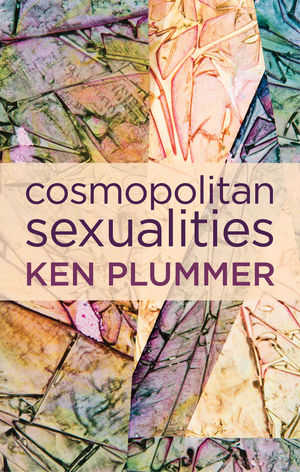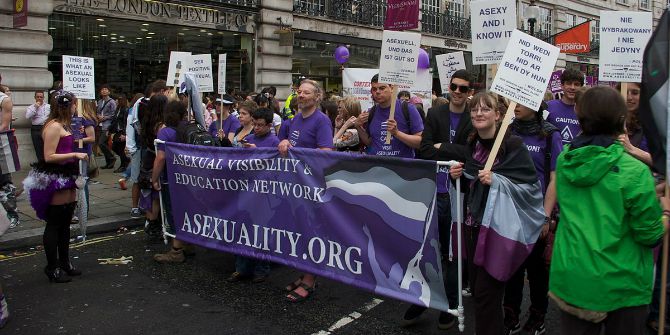
Cosmopolitan sexualities are those “that live convivially and reciprocally with a variety of the diverse genders and sexualities of others, both within and across cultures”, writes author Ken Plummer in his book Cosmopolitan Sexualities. Reviewer Vanessa Longden finds this book to be ambitious and insightful, as ‘it calls for the blending of localism with cosmopolitanism to create a better world where sexual differences will not cause so much pain’.
Cosmopolitan Sexualities. Ken Plummer. Polity. 2015.
Today, we are submerged in a “vast labyrinth of desire, gender and reproduction.” The digital age has made body politics ever more visible and while our connections to others globally may be virtual, it does not mean they are less tangible. New social movements flourish through contested relationships with the state: many have witnessed the student protests in Hong Kong; the Russian Pussy Riots; Occupy Wall Street; and the wider Global Justice Movement (GJM). Recently, same sex marriage has been legalised in the US after a Supreme Court ruling in 2015. China has decriminalized homosexuality and a thriving gay culture has emerged in its cities; the same cannot be said for the situation in Russia. In Iran, Afghanistan, Saudi Arabia and Cyechnya, gay sex can result in the death penalty. There are also many cases of transgender rights activism (Press For Change) and the emergence of personal accounts via blogs and online communities. Numerous women’s movements fighting against patriarchal orthodoxy has expanded from a local to global scale: Feminist activist and writer, Eve Ensler, founded the One Billion Rising campaign to end global violence against women and girls after the Delhi bus gang rape of 23-year-old Jyoti Singh in 2012. In Chibok, Nigeria, Boko Haram kidnapped more than 250 female students as part of a widespread Islamic insurgency. The Bring Back Our Girls movement became a global concern over social media and news sites; yet their future remains uncertain.
These are a few of the contexts which interweave Cosmopolitan Sexualities. Plummer’s text is ambitious and insightful: the reader is presented with a wealth of contextual empiricism, perceptive research and critical analysis on what it means to be human, whilst still remaining accessible to a wider readership. The author also assumes the challenge of grasping human vulnerabilities. How can we live with diverse desires and account for these tangled and emotional bodies? Can we found collective values in a pluralistic universe?
Cosmopolitan sexualities are those “that live convivially and reciprocally with a variety of the diverse genders and sexualities of others, both within and across cultures.” Plummer warns that the term itself still needs considerable revision. Cosmopolitanism can easily become a symbol of Western hegemony and its ‘universalism’, a colonizing version of neoliberalism under the control of rich elites or the dominant West. Terminologies need to be critiqued and used with care. Not all terms can be transplanted across cultures and to assume otherwise would be foolish. ‘Cosmopolitan’ is far from a familiar or accepted terminology, but like all definitions it needs to be reassessed in light of our own time and place until a more fitting expression comes along.

The publication’s sub-structures offer springboards for further academic critique. ‘Divided and pauperized sexualities’ raises important questions over the divisions of sexual lives—such as caste, class, slavery and economic divides. What is sex like in beds with many others? What about when you are homeless, or when the ill and the dying surround you? This is a world of sexualities that needs to be explored further. Another chapter, ‘Subterranean sexualities’, comments on non-mainstream and emerging social movements like AVEN (Asexual Visibility and Education Network), which was founded by David Jay in 2001. The community aims to create public discussion and acceptance of asexuality. AVEN has become increasingly visible with the aid of technological advancement, demonstrating how once overlooked sexual stories come to the forefront of society and circulate the world.
The theory of ‘cosmopolitan sexualities’ has no centre, which offers a flexible space for multiple dialogues to emerge not only among the West but where two-way discussions span geographical borders. Plummer presents a global viewpoint which seeks progressive change through practical and creative activism for the many, not just the few. The text does not instruct readers on how to implement global change; “How could it”, says Plummer. “Try as I may to be global, I come back to my home and my roots.” This is just as much a deeply personal account, demonstrating how our walks-of-life intersect. Cosmopolitan Sexualities calls for the blending of localism with cosmopolitanism to create a better world where sexual differences will not cause so much pain. But first, readers must question existing social orders.
Plummer has rightly been praised for his ‘utopian’ account but the term should not be misunderstood. He does not see utopia as an idealistic place; rather, it is a process through which we can learn, reflect and pass on the best attributes to future generations. What Plummer offers us is more than an idealistic structure, but an indispensable and valuable perspective. Cosmopolitan Sexualities is influenced by humanism, a notion which is itself not without criticism. Humanism has been associated with secularism, atheism and with Renaissance and Enlightenment thinking. To some, this viewpoint connotes rational and unified man and the ‘universal truth’ of his superiority. To accept this is narrow-minded, Plummer argues. Instead, he believes there are many humanisms just as there are multiple selves. Humans are ‘open-ended’: they are complex transformative beings which are historical, social, biological and full of potential. I cannot help but associate Plummer’s opinion with the likes of French feminist thinker, Hélène Cixous, who encouraged her readers to “be better humans”.
Ultimately, we must be aware of our own normative baseline and its prejudices. Tolerance of other’s sexualities is not enough without self-reflection and personal critique, yet these qualities are often lacking in society. As Plummer writes, “it is very hard to imagine our world leaders […] inspecting their stances and their personal sexual lives.” Without self-contemplation, any chance of a wider conversation about sexual politics is prevented and positive change is therefore absent. It is the job of cosmopolitanism to stay grounded in the local while pushing the boundaries of intellectual thought on an academic level. The challenge, “is to contextualize and not essentialize these ‘other’ worlds.” Despite the cruelties of the world, where conflict and dehumanization is daily news coverage, Plummer remains hopeful. He puts his faith in acts of human kindness and consideration. No matter how small these gestures may be they are all significant, as are their actors. Plummer has enabled cosmopolitan sexualities to “breathe a little”, and it will go on. Just hold your breath.
Vanessa Longden is a doctoral candidate in the Department of History at Lancaster University, UK. Her current research interests and writings explore the (re)construction of photographic space in addition to the portrayal of performative bodies and identities in visual culture. She will be taking up a postgraduate position at Durham University working in conjunction with the Department History, the Centre for Visual Arts and Culture (CVAC) and the Leverhulme Trust. Vanessa’s blogs at https://papermargins.wordpress.com/. Follow her here: @VanessaLongden








1 Comments